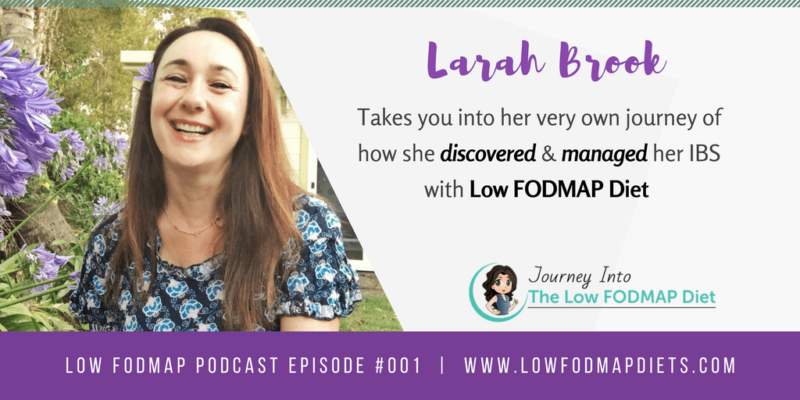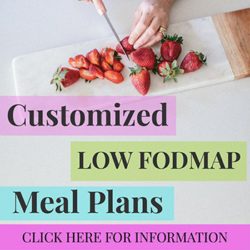Finally, the Low FODMAP Diet and IBS Podcast is now available online!
Are you suffering from Irritable Bowel Syndrome and struggle to find a way to manage your symptoms? If your answer is yes, you are just like me, a few years ago. Now I control my horrible IBS symptoms mainly by following a low FODMAP diet. In the Low FODMAP Diet and IBS Podcast, we will hear from IBS and low FODMAP Diet experts and also different stories from people who are suffering from IBS and have been following a Low FODMAP Diet to manage their IBS issues.
I am super excited about starting this podcast and I hope you will enjoy it too!
In this very first episode, I will be sharing:
- my experience with IBS
- the journey followed before being diagnosed with IBS
- how my life changed after being put on a low FODMAP diet
- the food I loved but had to give up
- how I manage my symptoms nowaday
Quote of the day: “A good health is really the greatest of all possessions.”
Can’t listen to this episode right now? Read the transcript below!
LARAH: Hi and welcome to the very first episode of the Low FODMAP Diet and IBS Podcast.
First of all, let me ask you some questions. Have you been suffering for quite a long time from bloating, abdominal pains, cramps, excess gas, diarrhoea, constipation or a mixture of the two and have you been going around in circle to find a reason of why you’re feeling the way you do, but struggle to find any answers? Well, if your answer is yes, you can definitely relate to my story and my experience and you may want to continue listening. I suffered from IBS and after many years of continuous suffering, I am now managing my IBS Symptoms by following a Low FODMAP Diet.
I’m so super excited about starting this podcast and be able to spread the message of the Low FODMAP Diet. I’ve been wanted to do this for a real long time. I just had to push the boundary of my comfort zone, I guess. During this episode, I would like to share my experience and my journey with you but, because we’re all different and our symptoms maybe different and also our food intolerance, it would be really interesting for everyone to hear also your stories. For this, I ask you to please share your story with me. You can contact me by social media or on my website and I will definitely get back to you. I will give you all the details at the end of this episode.
Well first of all, I should introduce myself properly. My name is Larah, I am of Italian origin but I’ve been living in Australia with my family for more than ten years. I have been suffering from IBS for about five or six years. But since 2013, I’ve been managing those horrible symptoms by following a Low FODMAP Diet.
Before being diagnose with IBS. I spent many years being sick, without knowing the cause. I was bloated almost after every meal I ate. I have a IBS-D; therefore, I had to run to the toilet several times a day. I had a constant general feeling of unwellness and often I had chest pains similar to unstable angina symptoms.
During those years, I visited several health practitioners and nobody could really tell me what was wrong with me. A slight improvement came when one of these practitioners told me to try and eliminate things like bread, pasta, pizza and of course all other wheat foods such as biscuits and cakes.
So you can just imagine what happens when you ask an Italian person to give up pasta and pizza?! Well, you guessed it right; I was in total meltdown. But then after that initial shock, I thought, I’d rather feel better than eating food that makes me sick. If you think about it, when you eat something you have the pleasure for thirty second or a minute…. and then you’re sick for the rest of the day. That doesn’t seem right…… so I did eliminate wheat products.
After a few days, I felt slightly better, but then I started to replace that food with a lot more vegetables and especially a lot of vegetables soups and also salads. The soups I made had things like garlic (a lot of garlic), cauliflower, broccoli and other vegetables and as I didn’t have a clue up about high FODMAP food. I was really puzzled when I would bloat almost immediately after eating this healthy food and I was thinking how come I still feel sick? I am eating so healthily, anyway on top of the bloating and everything else. I also had angina type of pains, which usually happened about two or three times per weekly. I really thought I had some type of heart condition.
So I started to cure myself by taking an aspirin, when I had the pain. I thought that would help me because I’ve heard that aspirin helps to thin the blood and can help if you have heart problems and that without really doing much research. I would take an aspirin and within ten-fifteen minutes the pain was gone, but it was probably just a coincidence or the fact that these pains only usually lasted about ten or fifteen minutes. I had the pains mainly in the middle of the night or very early in the morning, and it was at a real weird sensation. The pain would starting my jaw and then it would travel down my throat, then on my neck, then my chest and then on the upper part of my back. And it wasn’t like an excruciating type of pain. But it was quite disturbing and annoying.
Finally after many years of going around in circle, I found a new doctor. This new doctor really listened to me when I explained him all my symptoms and he said ‘Okay let’s do some tests so we can rule out some different illnesses.’ So I had scans of my organs, I did blood tests, stool test, breathe tests and other different things. At the end of it, it came out that my organs were perfectly fine, and my heart was also fine, thank goodness; and what I had was IBS.
So my doctor referred me to a dietitian. And when I saw the dietitian, she immediately said that there was a diet” that had been created and really helps people that have the same condition as me, which is Irritable Bowel Syndrome. She asked me if I wanted to try it and immediately I said “yes sure I’ll try anything.” And then she showed me the list, the list of all the food I could no longer eat. And I can tell you my shock… that list had everything I ate every day. So again, just imagine being an Italian, what do we eat? Yes, of course pizza, pasta, and all the sauces, have garlic and onions in them. Plus all the other vegetables, and in addition to that, there were other things that I really enjoyed eating almost on a daily bases, like avocado, hummus, mango, etc.
I said, I was willing to do whatever it took and she explained to me to follow an elimination diet for about six weeks. So I had to eliminate all the food that was on the list that was high FODMAP and just eat the food that was low in FODMAPs.
Unfortunately, I couldn’t see the dietitian for much longer because I had planned to go to Italy for five months with my daughters, so that they could learn Italian and I could visit my family.
The dietitian suggested for me to download the low FODMAP diet app on my smart phone, this is an app that has been created by Monash University. In there I could find all the food that has been tested for FODMAP content.
When I arrived in Italy I told my family that unfortunately, it would have been very unlikely for me to eat the food they prepared, if they invited me for lunch or for dinner, because all their foods would have contained high FODMAPs. But my families were very accommodating and they tried to cook for me like gluten-free pasta, even gluten-free pizza and sauces without onion or garlic. So it wasn’t too bad, it was probably worst when I tried to eat out, because there wasn’t that much food I could have eaten. In Australia you can pretty much go anywhere and have a grilled chicken salad or a grilled fish with vegetables, but in Italy I really struggled to find suitable food, a part from when I went to my family’s house.
After eliminating all the high FODMAP food for about six weeks, I started to slowly re-introduce some of that food to see how I would react and I have to say that now a days, I probably still have about eighty-five percent to ninety percent low FODMAP food, but there are food that are high FODMAP and that I can now have a moderation.
So that’s not too bad and I have got used to it. When I came back to Australia, I decided to start to write a blog about the low FODMAP diet. Just to share my experience and share my knowledge and really be able to spread the word.
Now I have started this podcast for exactly the same reasons, being able to spread the word on this low FODMAP diet that has been found successful for about seventy five percent of the people that suffered from IBS.
Now let me now tell you a bit more about this podcast. During each episode, I will interview all sorts of IBS and Low FODMAP Diet experts such as dietitians, nutritionists, doctors, and fitness experts, even Low FODMAP Diet bloggers like me, and people that have created low FODMAP diet recipes, as well as people like you and me, who suffer from IBS and I have been able to manage their IBS symptoms by following a low FODMAP diet or even people that suffer from other digestive issues and they been successful in controlling their symptoms through the diet.
We came to the end of the very first episode of the Low FODMAP Diet and IBS podcast and I really thank you for listening to this episode until the very end and I hope you will reach to me with your stories.
Now I would like you to leave you with my best wishes and one of my motto, “A good health is really the greatest of all possession.” And I hope that you will feel better soon and will be able to leave a good healthy life. Until next time, take good care. Bye!
Links and resources mentioned in this episode:
-
Yoga with Adriene on YouTube
-
The Low FODMAP Diet App from Monash University
-
Monash University Low FODMAP Page
Links to Larah’s social media:


